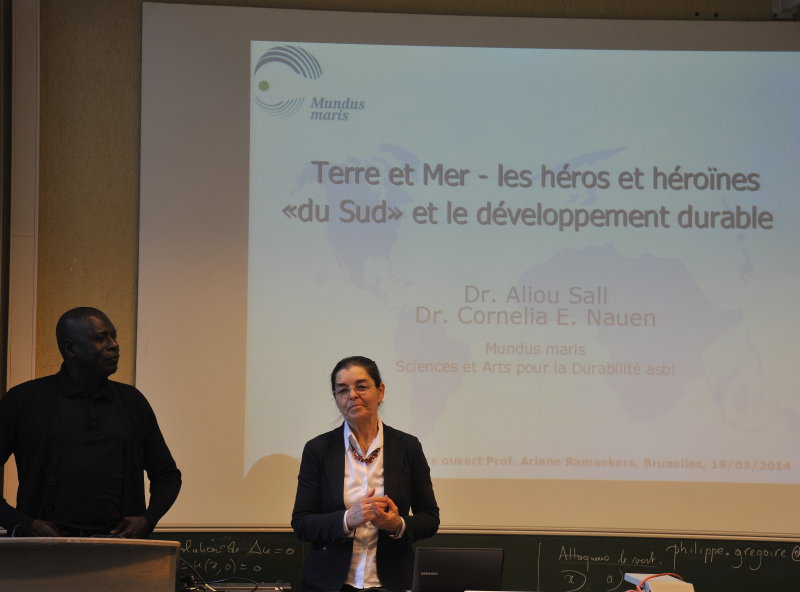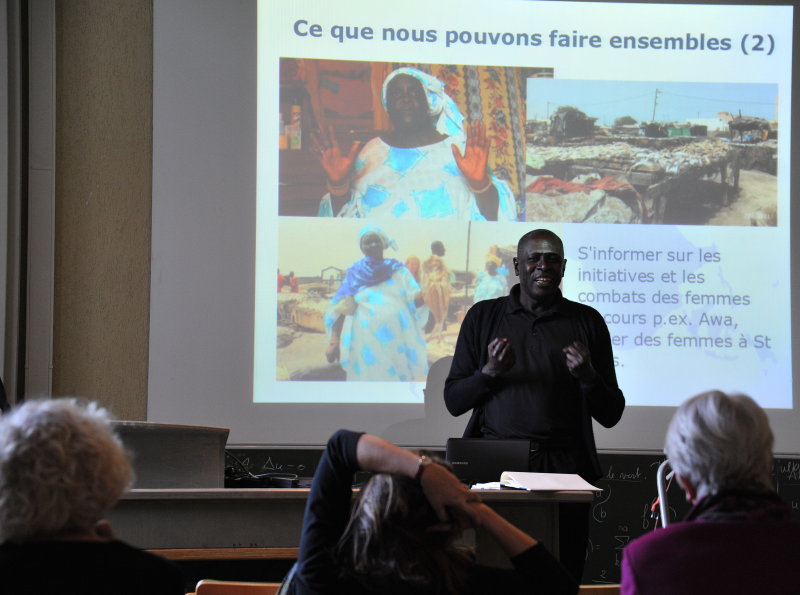Open Course - The unsung heros of the South in the struggle for sustainable development
 Setting local activities and living into the wider context of the global structure and interaction between the ocean and the land - this was the key concern of the course given by Cornelia E Nauen and Aliou Sall of Mundus maris. The talk started by sharing some key parameters about these two large and diversified spaces that make up our living environment.
Setting local activities and living into the wider context of the global structure and interaction between the ocean and the land - this was the key concern of the course given by Cornelia E Nauen and Aliou Sall of Mundus maris. The talk started by sharing some key parameters about these two large and diversified spaces that make up our living environment.
Prof. Ariane Ramaekers had invited Mundus maris again to give an open course to her class "Biology and Society". this was part of the Campus Plein Sud Programme at the Free University Brussels (ULB).
The talk started with a global overview illustrated by Cornelia E Nauen. Did you know that 71% of the surface of the Earth is covered by the ocean? This is why it's called the Blue Planet when you look at it from space. Did you know that the deepest trench in the ocean - the Mariana Trench - is deeper than the highest Mountain towers into the sky - Mount Everest? Did you know that we produce enough food for more than the 7 billion humans we are today? How come that almost one billion go hungry and more than one billion is seriously overweight?
Did you realise that social inequality and denial of legitimate rights is now probably the most serious obstacle to living sustainably and in tune with the land, the ocean and fellow humans? Research has shown blatant inequality to be a major source of waste and destruction.
 These and other questions and information formed the context from which Aliou Sall homed in to tell the story of Awa Seye, an important leader in artisanal fisheries in Senegal, midwife and municipal councillor in her native Saint Louis.
These and other questions and information formed the context from which Aliou Sall homed in to tell the story of Awa Seye, an important leader in artisanal fisheries in Senegal, midwife and municipal councillor in her native Saint Louis.
The images tell a touching story and bring some of the physical and cultural conditions to live which might otherwise be difficult to understand only in terms of "cold" data.
The talk, that nicely turned more into a questions and answers exchange. Perhaps the most important message coming across was that many of the current crises and problems identified are not so much the result of a global conspiracy than the result of millions of small decisions. These may individually be harmless, even adapted to context. But altogether they create global effects.
Turn this insight around and find that even though any individual alone can not "solve" these really big and now interconnected crises in social, environmental and economic terms, but jumping to the conclusion not to do anything is a big mistake. Collectively we do have the chance to change for the better.
So, let's start - letting the baby fish grow to maturity - practising solidarity with the socially weak - recognise other cultures - saving energy to stabilise our climate - stop using plastic bags to avoid choking the ocean and its magnificent creatures.
That's a good way to start every day, every week, month and year! The ppt presentation (FR) is available here.








